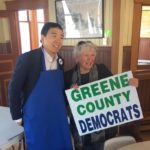
The idea of a $1,000 a month paid by the federal government to every U.S. citizen older than 18 sounds “out there”, but Andrew Yang, a Democratic candidate for president who espouses the universal basic income (UBI), made it sound more realistic.
Yang’s UBI, a “Freedom Dividend”, is similar to Alaska’s petroleum dividend, he explained to about two dozen Democrats and members of the media at the Milwaukee Road depot in Jefferson Feb. 1. Yang founded Venture for America, which helps entrepreneurs create jobs in economically challenged cities like Baltimore, Cleveland and Detroit. Those cities have been hit hard by a decline in manufacturing jobs.
According to Yang, Donald Trump won the 2016 election because the country “automated away” 4 million manufacturing jobs including 40,000 jobs in Iowa. Yang predicts further job losses in the retail sector, call centers, fast food restaurants, and even truck driving.
“We’re in the third inning of the greatest economic and technological transformation in the history of our country,” Yang said.
The first inning was the deregulation of financial services. The second inning was the decimation of manufacturing workers.
The third inning is the phasing out of brick-and-mortar retail stores. He said 30 percent of retail malls and Main Street stores will close in the next four years. Amazon is “sucking” $20 billion from communities every year, and with it, jobs are leaving. Retail jobs are the most common jobs in the country, he said. “The question is what’s going to happen to those workers when those malls and stores close.”
The fourth inning will be self-driving cars and trucks, which he says is only 5-10 years away.
Estimates are that autonomous vehicles will save $168 billion per year in labor and fuel efficiency, equipment utilization, and safety concerns. But there are 3.5 million truckers in the country; truck driving is the leading job in 29 states in the country; and there are 30,000 truckers in Iowa alone.
There will likely be 350,000 tele-operators of autonomous trucks, cutting jobs in the industry by 90 percent. Yang said the average truck driver is 49 years old, has a high school diploma, and makes about $46,000 per year. An estimated 350,000 truckers have loans on their truck.
It’s not known what jobs might be available for truckers put out of work by robot trucks. According to Yang, government retraining programs are between zero and 15 percent effective.
“We’re in the third inning of this transformation, and for whatever reason, our leaders are asleep at the switch… We’re about to automate away the most common job in the economy,” Yang said.
His UBI is a way to help transition the economy as automation claims the jobs now done by people.
He explains his Freedom Dividend by reminding people of Alaska’s Petroleum Dividend, which grants a share of oil wealth to all Alaskans, saying technology is the “oil” of the 21st Century. “What they’re doing in Alaska we can do for everyone in the country,” he said.
The Freedom Dividend would cost $3 trillion per year, with much of it coming through value-added taxes paid by tech companies. Yang is able to show sources for the needed revenue. He predicts it would be “trickle up economics,” with “ordinary” people having more disposable income, building the economy starting with their own Main Streets.
Yang also proposes single-payer healthcare and a new method of measuring the well-being of the country.
According to Yang, the GDP should be replaced by a measurement that considers quality of life, circumstances of retirement, the health of the environment and more. “The American scorecard would be a composite measurement of a lot of things, not just the profitability of corporations,” he said.
Yang spent 40 minutes answering questions. Most of them were about the Freedom Dividend.
One person asked him about dealing with racism. Yang said that as the only Asian family in upstate New York, he grew up with racism and felt it to be “background noise that’s always there.”
He explained racism as coming from a “mindset of scarcity,” and said financial insecurity begets racism. The Freedom Dividend would reverse financial insecurity and build a “mindset of abundance.” “Abundance and optimism decrease a negative approach to people who are different,” he said.
Yang has 80 different proposals on his website, yang2020.com. One would bolster community journalism by providing one $100,000 fellowship in every state for someone to work in a local newspaper providing coverage of local government.
